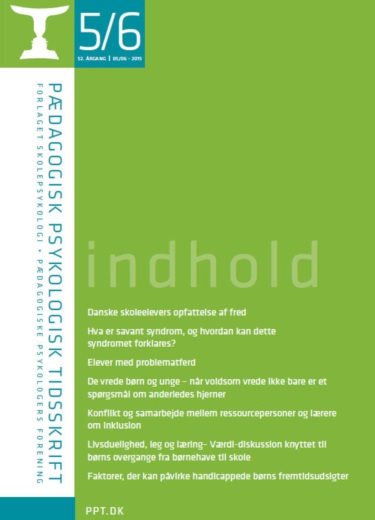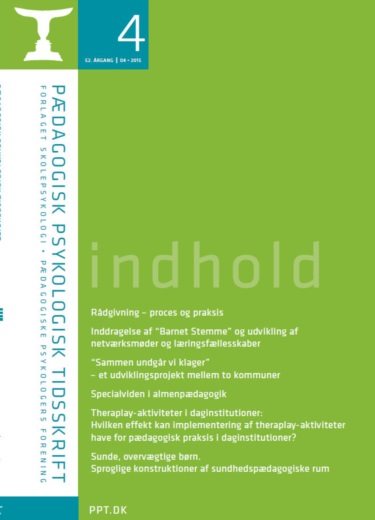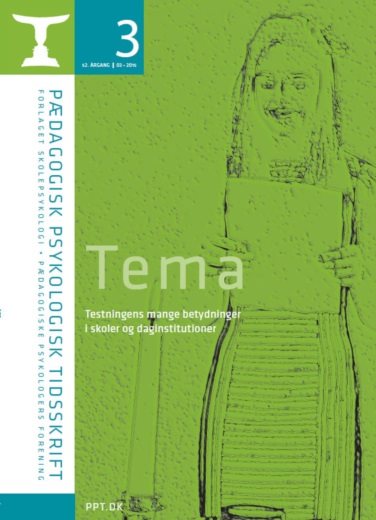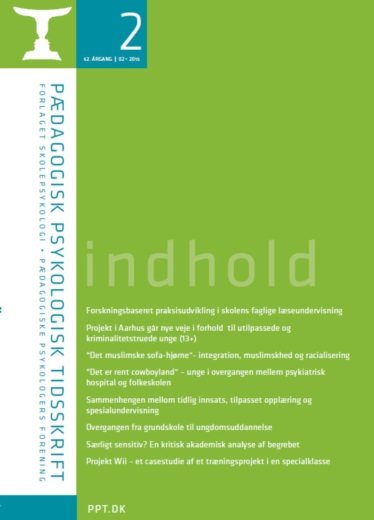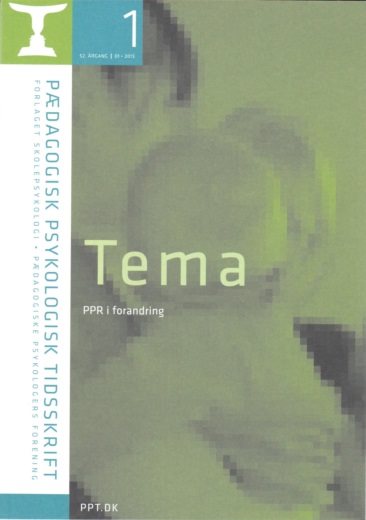Beskrivelse
Ann-Jeanett Foldager Bøndergaard, Cand psych & Peter Berliner, Professor of so- cial learning and development processes, Aarhus University : An empirical study of Danish children’s understanding of peace. Pædagogisk Psykologisk Tidsskrift, 2015, Vol 52, 5-6, 3-14. The article presents a study of 212 Danish 6th grade pupils’ perception of peace The results include that the children relate peace to three distinct areas: (1) the world (the international community, the national so- ciety, and the local community; (2) face-to-face social relationships and interactions; and (3) modes or states of mind In area 1 there is a predominant use of negative definitions of peace as absence of war In the two other areas there is a predomi- nant use of positive definitions of peace This study of Danish children’s perspec- tives on peace provides knowledge which can be applied in planning and imple- menting peace education in schools in Denmark
Nils Kaland, Professor em , dr polit , Lillehammer University College What is savant syndrome, and how can one explain this syndrome? Pædagogisk Psykologisk Tidsskrift, 2015, Vol 52, 5-6, 15-29. Savant syndrome is a rare condi- tion that occurs together with autism spectrum disorder (ASDs; autism, atypical autism and Asperger syndrome). Savant syndrome refers to individuals, who despite serious, mental impairments, show remarkable abilities on certain, often small domains. About 10 percent of individuals with ASDs have savant syndrome in varying degrees. The causes of savant syndrome are unclear. However, cognitive hypotheses claim that im- pairments in theory of mind, executive functions may predispose to talent in savant do- mains, and so does a detail-focused cognitive style. Alternatively, savant syndrome may be caused by a developmental disorder of the brain, or in some cases by an acquired brain lesion. These hypotheses do not so far seem to account for the causes of this fas- cinating syndrome.
Terje Ogden, Professor II at the Department of Psychology, University of Oslo Stu- dents with behavioral problems. Pædagogisk Psykologisk Tidsskrift, 2015, Vol 52, 5-6, 30-48. This article is about how student problem behavior can be under- stood, but also prevented, reduced or stopped as a collaborative effort between home and school The approach is multi-theoretical, and problem behavior is pri- marily conceptualized as a skill deficit, and a lack of cognitive and social skills The concept of evidence-based practice in school is elaborated on and exemplified, in- cluding the relevance of implementation and evaluation of structured programs The recommended organization of education for students with behavior problems is presented according to the principle of inclusion and the “response to intervention” model consists of three tiers of intervention with increasing intensity The RtI mod- el uses a combination of a standard intervention protocol and a problem solving ap- proach in order to make decisions and match academic and behavioral interven- tions to student needs The social information processing model forms the theoreti- cal basis for most social skills and social competence programs At the prevention level, a social curriculum is recommended as a universal element along with school- wide training in classroom management for teachers Small group interventions and individual plans along with extensive home-school collaboration may be added for students with serious and complex problems Central to understanding, teach- ing and learning processes, are the concepts of executive functions, self-regulation and social competence Transactions between cognitive and social skills lay the foundation for social and academic learning, and among the recommended inter- ventions are “tools-of-the mind” activities, classroom management and the learning of social skills
Maria Dressler, Psychologist, Camilla Obel, Teacher, Kasper Mikladal, Psycholo- gist – all employees in the Diamond Process project, Pedagogic Development Center (PUC) – Rødovre Municipality: The angry children and adolescents – When vi- olent anger is not just a matter of different brains. Pædagogisk Psykologisk Tidsskrift, 2015, Vol 52, 5-6, 49-66. Many children and adolescents express their anger in inappropriate and even aggressive ways Angry reactions and actions often cause problems both for themselves and their surroundings From a professional perspective, these children and adolescents can be difficult to understand and handle Why do some children repeatedly hit others though they know both the ru- les and the consequences of their action? The angry reactions and actions might also cause a professional dilemma, e g for school teachers who are not only respon- sible for the well-being of all children in a class, but also responsible for handling the one acting out and frightening the others In cooperation with ‘angry children and adolescents’, we have developed professional programs addressing community development and anger management for children and adolescents This article deri- ves from our work Amongst other things, it will argue that changing inappropriate individual reactions requires a community that offers alternative options And it will argue the necessity of a general professional approach for understanding children and adolescents as based on circumstances, relations and experiences A general approach facilitates the development of appropriate understandings among children.
Tilde Mardahl-Hansen, PhD Student, Department of Psychology and Educational Studies, Roskilde University Conflict and cooperation between the resource persons and teachers about inclusion. Pædagogisk Psykologisk Tidsskrift, 2015, Vol 52, 5-6, 67-79. The article presents analyze from an empirical study on the work of a ‘Team for Inclusion’ in a Danish primary school The aim is to illustrate how the daily work of ‘resource teachers’ can be characterized by dilemmas The article highlights that these dilemmas are connected to the ways structural conditions constitute possibilities and constraints for inclusive education However, often these dilemmas are played out as personal conflicts between “general tea- chers” and “resource teachers” as they have different perspectives on possibilities and constraints for inclusive education With ‘consensus’ and ‘togetherness’ as ide- als for collaboration, differences of perspective are understood as ‘resistance’ and related to specific teachers as problematic
Drawing on Erik Axel, among others, the article builds on an understanding of col- laboration as conflictual cooperation. In this understanding, conflicts between ‘re- source teachers’ and ‘general teachers’ are not necessarily mistakes, but related to differences in tasks, responsibilities, knowledge, possibilities
Mariane Hedegaard, Professor of Developmental Psychology at the Department of Psychology, University of Copenhagen Kasper Munk, PhD Student at the De- partment of Education, University of Oxford, England Kirsten Sørensen, Kin- dergarten Principal at Klatretræet, Frederiksberg Municipality Jette Hülsen, Kindergarten Principal at Louis Petersen’s Kindergarten, Frederiksberg Munici- pality Life competence, play and learning value discussion related to children’s transition from day care to school. Pædagogisk Psykologisk Tids- skrift, 2015, Vol 52, 5-6, 80-94. How do new values about children’s lives in day care develop and how do these values influence the everyday practice in day care centers?
New demands can arise from ministerial reports, but most often these demands are grounded in the day care center or in the school Hence, the development of new va- lues must be seen, also in the day care centers, as a dialectic between, on the one hand, demands and considerations that come from other practices and, on the other hand, the values that already shape the day care tradition and its everyday practi- ce This article presents reflections from a project that investigated how new school initiatives led to the formulation of life competence as a central concept for day care practice In a shared project, managers and day care teachers from two day care centers have, in collaboration with the researchers, pursued the goal of formulating and sharpening day care practice by focusing on the development of children’s life competence in daily routines and play in the day care center Thereby, the aim has been to provide children with the best possible preparation for their first year of school
Linda Jørgensen, currently taking a master’s degree in special education at the Da- nish School of Education (DPU) Factors that can affect the future prospects of children with disabilities. Pædagogisk Psykologisk Tidsskrift, 2015, Vol 52, 5-6, 95-106. The reason for this article is a concern about the future of children with disabilities In Denmark, there has been very little research in the effects of diffe- rent types of special education However, some studies show that children who attend special schools have poorer prospects than children who are included in main- stream schools.
In this article, I try to answer the question: Do special schools provide their stu- dents with skills required to handle life outside of special schools?
Through a review of international research on the effects of special education, I find that there is still need for more research in the variables that influence the pro- spects of children with disabilities
